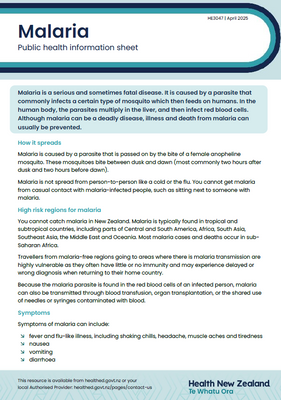Malaria public health information sheet - English HE3047

The full resource:
Malaria is a serious and sometimes fatal disease. It is caused by a parasite that commonly infects a certain type of mosquito which then feeds on humans. In the human body, the parasites multiply in the liver, and then infect red blood cells. Although malaria can be a deadly disease, illness and death from malaria can usually be prevented.
How it spreads
Malaria is caused by a parasite that is passed on by the bite of a female anopheline mosquito. These mosquitoes bite between dusk and dawn (most commonly two hours after dusk and two hours before dawn).
Malaria is not spread from person-to-person like a cold or the flu. You cannot get malaria from casual contact with malaria-infected people, such as sitting next to someone with malaria.
High risk regions for malaria
You cannot catch malaria in New Zealand. Malaria is typically found in tropical and subtropical countries, including parts of Central and South America, Africa, South Asia, Southeast Asia, the Middle East and Oceania. Most malaria cases and deaths occur in sub-Saharan Africa.
Travellers from malaria-free regions going to areas where there is malaria transmission are highly vulnerable as they often have little or no immunity and may experience delayed or wrong diagnosis when returning to their home country.
Because the malaria parasite is found in the red blood cells of an infected person, malaria can also be transmitted through blood transfusion, organ transplantation, or the shared use of needles or syringes contaminated with blood.
Symptoms
Symptoms of malaria can include:
- fever and flu-like illness, including shaking chills, headache, muscle aches and tiredness
- nausea
- vomiting
- diarrhoea
Malaria may cause anaemia and jaundice (yellow colouring of the skin and eyes).
For most people, symptoms begin 10 days to four weeks after infection, although a person may feel ill as early as seven days or as late as one year later.
If not promptly treated, infection with one type of malaria, P. falciparum, may cause kidney failure, seizures, mental confusion, coma and death.
In between episodes of fever, a person with malaria can appear deceptively well. However, any person with a fever or flu-like illness who has been to a malaria-risk area in the past 12 months should be tested for the disease.
Treatment
Malaria should be treated early in its course, before it becomes serious and life-threatening.
Several good anti-malarial drugs are available in New Zealand. The types of drugs and length of treatment will depend on several factors, including the type of malaria, where the person was infected, their age, whether they are pregnant, and how sick they are at the start of treatment.
Risks and complications
P. falciparum can cause severe and life-threatening malaria (sometimes referred to as ‘malignant malaria’). P. falciparum is very common in many countries in Africa south of the Sahara desert.
Malignant malaria may progress to life-threatening coma or a severe state of shock.
People who have little or no immunity to malaria, such as young children, pregnant women or travellers coming from areas with no malaria, are more likely to become very sick and die.
Prevention
You can reduce the risk of getting malaria while overseas by:
- taking anti-malarial drugs to kill parasites
- wearing clothing that covers the arms and legs, especially if outdoors at night
- applying Permethrin insecticide to clothes; Permethrin can be bought at Travel Medicine Clinics
- sleeping under mosquito nets, preferably impregnated with Permethrin
- applying insect repellent to skin - the most effective repellents are those containing DEET (diethyl toluamide) – at a concentration of between 30% - 35%
- using electric insect-repellent devices, or mosquito coils
- when possible, staying in accommodation that has screens on doors and windows, or is airconditioned.
Many effective anti-malarial drugs are available. Your healthcare provider and you will decide on the best drug for you based on your travel plans, medical history, age, drug allergies, pregnancy status and other health factors. To allow enough time for the drugs to become effective, and for a pharmacy to prepare any special doses of medicine (especially doses for children and infants), visit your healthcare provider 4-6 weeks before travel.
For more information
For more information visit:
You can also call Healthline for free on 0800 611 116 or contact your doctor or practice nurse.